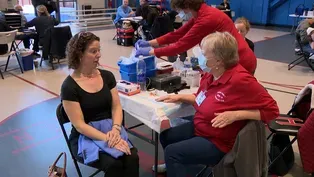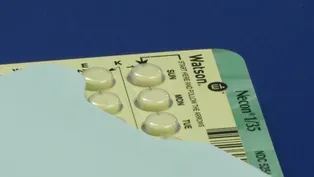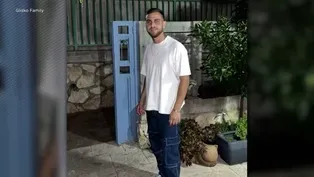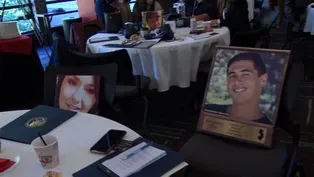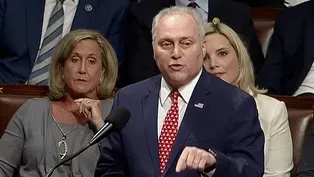NJ Spotlight News
Solitary confinement remains common in NJ prisons
Clip: 10/11/2023 | 3m 50sVideo has Closed Captions
Interview: Terry Schuster, New Jersey Corrections Ombudsperson
Solitary confinement is often considered the harshest punishment handed out in prisons. It’s known to cause mental stress so severe that it's considered torture by the United Nations. New Jersey leaders sought to ban the practice years ago, passing a law in 2019 prohibiting keeping an inmate in a cell for 20 hours or more per day over an extended period.
Problems with Closed Captions? Closed Captioning Feedback
Problems with Closed Captions? Closed Captioning Feedback
NJ Spotlight News is a local public television program presented by THIRTEEN PBS
NJ Spotlight News
Solitary confinement remains common in NJ prisons
Clip: 10/11/2023 | 3m 50sVideo has Closed Captions
Solitary confinement is often considered the harshest punishment handed out in prisons. It’s known to cause mental stress so severe that it's considered torture by the United Nations. New Jersey leaders sought to ban the practice years ago, passing a law in 2019 prohibiting keeping an inmate in a cell for 20 hours or more per day over an extended period.
Problems with Closed Captions? Closed Captioning Feedback
How to Watch NJ Spotlight News
NJ Spotlight News is available to stream on pbs.org and the free PBS App, available on iPhone, Apple TV, Android TV, Android smartphones, Amazon Fire TV, Amazon Fire Tablet, Roku, Samsung Smart TV, and Vizio.
Providing Support for PBS.org
Learn Moreabout PBS online sponsorshipsolitary confinement is often considered the harshest punishment handed out in prisons it's known to cause mental stress so severe the United Nations classified the practice as torture in an attempt to ban that action State leaders in 2019 passed a law that prohibits keeping an inmate in a Cell for 20 hours or more per day over an extended period of time but a new report finds that people who run New Jersey's prisons aren't following that law Terry Shuster is the state's Corrections on buds person leading the office that monitors New Jersey prison conditions and he joins me now to discuss the report Terry Schuster Schuster thanks for coming on the show I'm interested to know specifically what did your team find in this report about the use of solitary confinement we went around to the disciplinary housing units in four of the prisons and we fielded a survey with the people who are living there and uh and so we connected with about um 200 250 people and asked them how much are you getting out of your cell on a given day and almost everybody said less than two hours um we then um went sort of Facility by facility and we gathered um the logs that the Department of Corrections the prison system itself keeps about people's movement in and out of their cells and we were able to kind of piece together sort of an average week at each facility making the same findings that people really weren't getting out of their cells so this is hundreds of State prisoners who are spending about 22 hours a day in that cell yeah on any given day it's between 700 and 800 people so why is this still happening uh when there are protections put in place why are prisoners still being sent to these uh confined quarters you know to actually comply with the law um and implement you know a schedule that gets people out of their cells and into activities and congregate um interaction uh it's a lot of logistics and I think the logistics can be interrupted really uh frequently by um by fights or by um medical care or by understaffing um one of the things that we found sort of the good news is that it can be implemented effectively and the department has um been able to prove that at the women's so in the disciplinary housing unit that's at the women's prison people are offered 4 hours out of their sale the key I think is in having fewer people on that housing unit and that's going to require some other policy changes and practice changes about how do how does the department deal with rule violations and um and can they have fewer people going into these settings where their movement is very very controlled because if they have fewer people they can get them out so less people would help these facilities to comply and be set up to succeed uh with this law yes and I think to that you know more consistent Staffing better sort of follow up on their own data um you know the department is keeping logs of who's getting out of their cell at what time and and for what um so they should be able to set performance goals and say hey for the last month we really weren't getting people out enough let's try to improve it by 10% 15% in the next month and monitor our own performance uh really important findings Terry Schuster is the state's uh Corrections on buds person Terry thanks so much for coming on to chat [Music] thanks
Free COVID-19 vaccine clinic hosted in Hoboken
Video has Closed Captions
Clip: 10/11/2023 | 4m 22s | Those walk-ins now include those 6 months and older (4m 22s)
Murphy touts birth control expansion as election heats up
Video has Closed Captions
Clip: 10/11/2023 | 1m | Abortion rights have become a key issue for Democrats (1m)
New Jerseyans dead, missing as Israel-Hamas war escalates
Video has Closed Captions
Clip: 10/11/2023 | 6m 9s | At a Hoboken vigil — Gov. Murphy gathered with to memorialize the dead (6m 9s)
NJ DEA holds second annual family summit to address fentanyl
Video has Closed Captions
Clip: 10/11/2023 | 4m 8s | In New Jersey alone, there were approximately 2,900 overdose deaths last year (4m 8s)
Rep. Steve Scalise nominated for House Speaker
Video has Closed Captions
Clip: 10/11/2023 | 4m 58s | Interview: Kelly Dittmar, associate professor of political science at Rutgers-Camden (4m 58s)
Providing Support for PBS.org
Learn Moreabout PBS online sponsorshipSupport for PBS provided by:
NJ Spotlight News is a local public television program presented by THIRTEEN PBS
